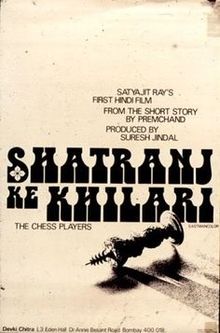
Last week I finished reading an excellent book My Adventures with Satayjit Ray—The Making of Shatranj ke Khiladi. The book has been written by Suresh Jindal, who also produced Shatranj ke Khiladi (The Chess Players). Shatranj ke Khiladi was the only movie that Ray made in Hindi/Urdu and was based on a short story of the same name written by the great writer, Premchand.
Dear Reader, before you start wondering as to why am I talking about a film and a book based upon it, let me get to the point. Among other actors, the film also starred Richard Attenborough, who played the character of General Outram.
Attenborough went on to direct the movie Gandhi. Jindal, who had produced Shatranj ke Khiladi, also happened to be one of the producers of Gandhi. While, Jindal makes no explicit mention of how he got around to producing Gandhi, in this book, it is safe to assume that he and Attenborough got acquainted during the shooting of Shatranj ke Khiladi and then one thing led to another.
Many books are written on what makes people and projects successful. A lot of academic research is carried out as well. But very little of it concentrates on the chance part of it. Allow me to elaborate.
Jindal wasn’t an established Hindi film producer. He had produced one slightly offbeat movie Rajnigandha, which had become the sleeper hit of 1974. After this, he got the idea of making a movie with the great man Ray.
He approached Ray through his friend Tinnu Anand, who had been Ray’s assistant for five years. “”Tinnu, I have a strong feeling that Manik-da [as people close to Ray called him] will do a film in Hindi soon,” Jindal writes in the book. Anand, agreed. They approached Ray. And he agreed to direct a film, telling them: “Actually… I have been thinking of doing a film in Hindi.”
Now this wasn’t the first time that Ray had been approached to make a film in Hindi. Legendary Hindi film producers like Raj Kapoor, SS Vasan and Tarachand Barjatya, had approached Ray in the past to make a Hindi movie for them and he had refused.
Nevertheless, he said yes, to a rookie Hindi film producer, who had just produced one film before Shatranj ke Khiladi. If Ray hadn’t agreed, the film wouldn’t have got made. And if the film wouldn’t have got made, Jindal and Attenborough wouldn’t have met and possibly Gandhi wouldn’t have been made either.
Of course, there is another side to it. While, Attenborough agreed to act in Shatranj ke Khiladi, he also happened to want to make a movie on Gandhi. And he ended up meeting Jindal. What do they say about, being at the right place at the right time?
Gandhi was nominated for Oscars (the Academy Awards) in 11 categories and won eight of them, including best director, best film and best actor. It also had the rare instance of an Indian winning an Oscar (Bhanu Athaiya shared the Oscar for best costume design).
The larger point here is that a lot of success in life is about people meeting by chance and then going on to do great things. The trouble is that this aspect doesn’t get talked about at all, when analysing the reasons behind the success of a person or a project or a company or simply even an idea.
While, we do talk a lot about hard-work and planning and everything else, which are also necessary for success, we don’t like to talk about chance. And the reason for that is very simple. The moment we start mixing chance with success, it dilutes all the hard work and the planning that has gone behind the success. And that is why we don’t like talking about it.
The column was originally published on November 1, 2017.